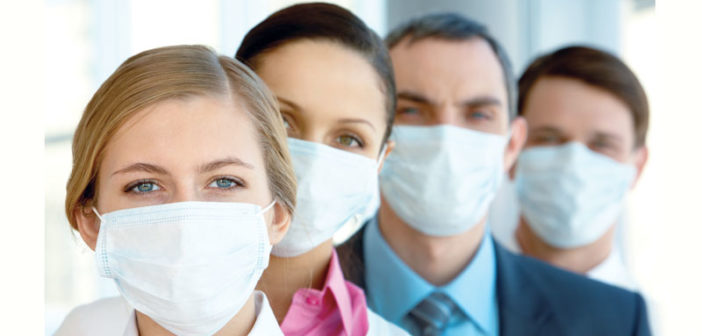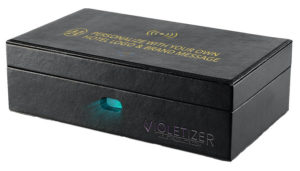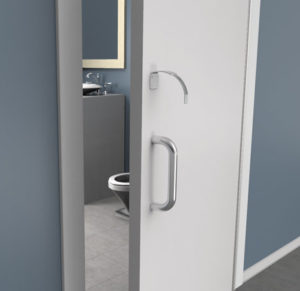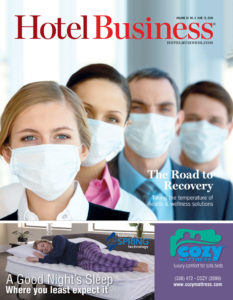In recent months, Hotel Business has reported on the COVID-19 pandemic, bringing readers the latest in industry forecasting from every angle—legal, financial and now, from a health and wellness perspective. While the unprecedented crisis is surely impacting financials, one thing has remained paramount for the past several months: our health.
Health and wellness has surely been a trend on the rise. Our minds went to destination spas, wellness offerings, advanced fitness facilities and healthy F&B programs. Now, health and wellness is taking on a new meaning: cleaning, sanitation and safety. While cleanliness was always top of mind for hoteliers, it’s now become a buzzword in its own right.
How will the pandemic affect the landscape of health and wellness in hospitality? What will guests expect, and how are hotels planning to meet these new and evolving needs? What will design and amenities look like going forward? It’s a different world, and while everyone is adjusting to a new normal, industry leaders are staying ahead of the game and planning for the future. New cleaning protocols, employee initiatives and innovative technologies and designs are some of the ways the industry is preparing, all to keep both guests and employees healthy and safe.
Brands weigh in
Major brands are taking the necessary steps to ensure safety, but they’re also implementing programs and initiatives to keep employees engaged and secure. Physical and mental well-being are of equal importance here, especially during a time when everyone is uncertain about what tomorrow will bring.
“If you don’t have your health, you don’t have anything,” said David Kong, president/CEO, Best Western Hotels & Resorts. “The health and well-being of our associates is of the utmost importance in demonstrating that we care about them. All the cleaning protocols that we have actually starts with them. We encourage them to take their temperature before they come to work, we have good sanitation standards that we set up, sanitizing stations throughout hotels and we encourage guests not to have daily housekeeping service.”
The story began back in 2012 for Best Western when it launched its I Care Clean program—requiring hotels to focus on high-touch items and areas with ultraviolet sterilization wands as well as TV remotes that can be disinfected—later maturing into what is now the We Care Clean program.
“We Care Clean is built upon that foundation,” Kong explained. “It’s not just about cleanliness; it’s about giving travelers and guests staying with us the visual cues that we care about them and, therefore, have made substantial changes to a lot of things. When they walk in, they notice an immediate difference.”
These visual cues include signs, decals on the floor, partitions at the front desk, sanitizing stations, furniture rearranged to encourage social distancing and decluttered guestrooms. Additionally, housekeeping carts will be assembled differently with linens kept separate, all intended for the guest to see.
“It’s a balance. You don’t want to scare people, and there’s also a cost consideration at a time when all businesses are so challenged; you don’t want to put undue burdens on the hotel owner/operator,” Kong said.
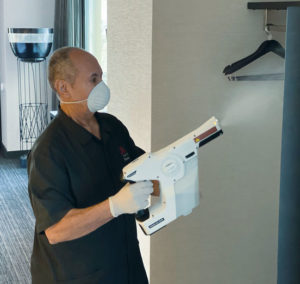
Marriott continues to release enhanced technologies, including electrostatic sprayers with hospital-grade disinfectant.
Marriott is also implementing enhanced measures that are visible to guests and employees, similar to that of Best Western. Along with the creation of the Marriott Global Cleanliness Council, the company is developing technologies in the next few months to tackle these new cleanliness concerns.
The council goes beyond disinfecting and takes a holistic approach, using safe, effective technologies to keep guests and employees healthy.
Some of the innovations include odorless electrostatic sprayers with hospital-grade disinfectants, which are approved by the EPA; hand-sanitizing stations; and they’re testing ultraviolet light technology for sanitizing guest keys and devices shared by associates.
According to Ray Bennett, chief global officer, global operations, Marriott International, and also the chair of the council, guests can expect to see more frequent cleaning of gyms, spas and lobbies with social-distancing measures in place.
“At many of our properties, guests can also choose to use their phones to check in, access their rooms, make special requests and order room service that will be specially packaged and delivered right to their door without contact,” Bennett added.
As for other, more permanent changes however, Bennett is confident that hotels won’t have to shift all that much. “I don’t think you will see a dramatic difference in design or the architecture of our properties. You will be seeing some changes at the property level—for example, more social distancing between tables in restaurants or between lounge chairs by the pool or at resorts,” Bennett said.
Accor has also made strides to ensure safety, particularly through it All Stay Well platform and partnership with AXA to provide medical support to guests. The partnership includes free access to medical teleconsultation and the ability for hotels to make referrals of medical professionals in AXA’s medical networks.
“The world has taken a turn that no one could have prepared for, and the result is a population that is more in tune with the fragility and importance of their own health than ever before,” said Andrea Torrance, SVP, guest experience, Accor North & Central America. “Guests need to know that the measures being implemented are not just for ‘show’ but are grounded in science and medicine.”
Torrance added that all measures being taken are not only validated by industry experts but compliant with the guidance issued by local, regional and national health, government and industry authorities. This includes hands-on employee training and regular audits to ensure initial and continued compliance.
“Words are only words; it is critical that we all take action to deliver a safe environment and protect the loyal employees and guests who keep our business going,” Torrance said.
She continued, “It’s impossible to know exactly how this will manifest in a post-COVID-19 world, but I suspect the growing desire to live healthier will evolve from a powerful cultural shift to a societal norm. How the travel industry adapts to this will directly impact our ability to serve the post-COVID-19 traveler.”
Torrance expects that partnerships—much like Accor’s with AXA—will help to ease guests’ concerns through innovations grounded in medicine. “This is one of the objectives of our All Stay Well program: to partner with the leaders and innovators disrupting the space, to explore the technologies and advancements that will ensure that healthy practices are more accessible than ever and wellness becomes a standard of travel,” Torrance said.
Four Seasons Hotels and Resorts has forged a partnership with Johns Hopkins Medicine International to validate its own Lead With Care program and will appoint hygiene officers, acting as on-site experts and ambassadors for the program.
Similar to this is Choice Hotels leveraging its relationship with Ecolab to develop its Commitment to Clean program, providing hotels with tools, resources and areas of focus. Choice will be designating a “Commitment to Clean Captain,” who will complete applicable best-in-class cleanliness training and will be responsible for communicating the new protocols and best practices to the rest of each hotel’s staff.
Branded partnerships may be the new normal, according to Adam Glickman, principal, Parallax Wellness + Hospitality, like the Four Seasons partnership, which is similar to Hilton’s collaboration with RB—the maker of Lysol and Dettol—and the Mayo Clinic.
“Trust and communication are paramount; an explanation of procedures (before, during and after a stay) [is an]invitation for guests to contribute to cleanliness and also to hold properties accountable,” Glickman said. “Each hotel company is rolling out their own version of standards, some with branded partnerships (such as Hilton and Lysol), and others with genuine certifications (such as with Hyatt and the Global Biorisk Advisory Council). In some cases, the region is actually leading the charge, as with the SG Clean certification in Singapore. In all cases, it leads to peace of mind for the consumer. Smaller operators are going to need to follow suit with clear protocols to ensure a consumer understands what they are doing and feels safe.”
In March, PM Hotel Group launched its Recovery Committee with top leaders in operations, facilities, F&B, risk management and communications to develop protocols in accordance with CDC, WHO and brands’ guidelines, ultimately resulting in PMxPM: Peace of Mind by PM Hotel Group.
“It’s about much more than a new level of cleaning procedures in the post-COVID-19 period,” said Joseph Bojanowski, president, PM Hotel Group. “We’ve developed a playbook that eases our guests’ peace of mind when they’re planning travel for themselves and their families. Sanitation and cleaning procedures are only one part of our program. We holistically addressed the entire guest experience to ensure we’re delivering on our promise for ‘peace of mind’ when guests stay with us—from arrival through departure.”
Technology and innovations provide ease
As brand-wide programs and protocols are put in place, leaders are also looking to technology to add another layer of guest protection. Touch-free devices, UV technology and antimicrobial products are some of these innovations; however, hoteliers are aware that as the current state of COVID-19 evolves, tech will have to follow suit.
“I think there will be different phases to the new normal. You can’t say the new normal is going to be this or that because the situation is constantly evolving, but you can say this immediate phase of a new normal is sanitation and cleanliness,” Kong said. “In past years, the hotel industry had these amenity wars to see who can outdo one another in terms of what we’re going to put in the bathroom, and then it evolved into design and who can have the most fun and social lobby; the next one is going to be cleanliness and who can outdo the other in terms of gadgets we use. I’m just kidding, but that’s the reality because we all recognize that’s of the utmost importance to the guest.”
Fuel, a provider of guest-facing hotel software solutions and digital marketing services, has expanded its digital-key functionality of its mobile application to help hotels stay ahead of the tech curve while giving guests some peace of mind.
The Fuel Contactless Mobile App integrated with Assa Abloy locking systems lets guests access their guestrooms using their mobile phone as a digital key, allowing them to bypass the front desk and potentially waiting in a crowded lobby.
“We’ve been spending a lot of time listening to the needs of hoteliers and guests regarding the mobile app and have been adding several features that improve the convenience and value for the customer at the same time as providing security and reliability for the hotel operator,” said Stuart Butler, COO, Fuel. “We’ve also expanded the flexibility that is provided via the app’s management tool, allowing properties to create visually stunning custom experiences and rich content with a few simple clicks.”
Guests can also check in and check out via the app, book a future stay, order room service and communicate with the property in real time; however, hotel leaders weren’t always convinced that they needed the added features.
“We’ve been developing the app for three years and have faced a lot of pushback from hoteliers who, up until recently, didn’t believe that an app was necessary; this was especially so for independent hotels,” Butler said. “Prior to COVID-19, guests prioritized convenience and familiarity. Now that everyone’s world has been turned upside down, we are all more willing to learn new behaviors and do things we haven’t done before if we believe that it provides us with more peace of mind.”
Hotel leaders have also communicated the importance of transparency during this time, and technology leaders are spreading a similar message.
“In the past, it was assumed that the lobby and the rooms were clean; in fact, hotels would wait until the night shift when guests weren’t around to polish the floors,” Butler said. “They didn’t want the guests to see the sausage being made. Now, because there’s an increased level of scrutiny and a new definition regarding cleanliness and safety, hotels are being more transparent and deliberate about making the guest see exactly what they are doing to ensure that the guest’s expectations are being met. An app is a very visible and effective way for hotels to show the guest that they are taking extraordinary measures to ensure their safety.”
Butler added, “I believe hotels will use this as an opportunity to refocus on technology that drives proven profitability as opposed to investing in the next ‘bright-and-shiny’ thing that comes along.”
Another app helping to streamline operations is the Trax Clean + Inspect from Trax Analytics. Housekeeping directors can alert in real time when an area needs to be cleaned, receive a check in that an attendant has arrived and attendants can fill out tasks accomplished and inventory used. Supervisors are also alerted to run inspections and quality control checks.
“Trax Clean + Inspect is customizable to fit the needs of each client we serve,” said Tracy Davis, president/CEO, Trax Analytics LLC. “With hotels in particular, we know there is a long list of tasks that go into cleaning each hotel room and common area. In digitizing that task list, among other inspection capabilities included in the app, and collecting that key data, we are not only expediting the process, but we are improving the quality of service based on the expectations set post COVID-19 and making it easier to track and maintain.”
SmartHands by Minibar Systems is also introducing new technologies as hoteliers shift their focus. The new microSure family of sanitizers and disinfectants—the eight-hour Defense Hand Sanitizer and microSure All Purpose Cleaner and Disinfectant—have mechanical-kill spikes that act as a barrier against germs and viruses beyond handwashing and chemical-kill alcohol-based products, which last long after product application.
“MicroSure is a newly EPA listed registered ‘device’ sanitizer and disinfectant, which means it provides long-lasting protection, making it superior to the traditional N-list products currently in the marketplace,” said Walt Strasser, EVP, Minibar Systems. “This new ‘device’ rating from the EPA ensures that the sprayed surface can be protected from six weeks to as long as three months depending on the activity of the surface from virucidal, bacterial and fungicidal microbials.”
Additionally, Minibar Systems’ SmartFridge Eco is integrated to a hotel’s PMS and only operates when guests want to use their fridge after check-in. The fridge will provide a “Rooms to Sanitize” report after checkout and, according to Strasser, SmartFridge Eco can reduce annual operating costs by more than 80% because it uses zero electricity in vacant rooms or rooms in which the guest doesn’t open the fridge door.
And, when it comes to bedding, Nicole Pasik, director of marketing, Focus Products Group, said of Protect-A-Bed products, “We’ve had our products independently lab tested to ensure they provide an effective viral barrier. Hotel guests spend more time in bed than any other space in the hotel. Our mattress and pillow protectors provide an easy, effective way to give guests the clean, comfortable sleep space they deserve.”
Hospitality continues to develop innovations like these, especially in the guestroom. Even prior to the COVID-19 outbreak, in-room cleanliness was always top of mind. The dreaded TV remote is among one of the most common concerns.
Smart Hospitality LLC, a company that installs DirecTV and interactive experience boxes, sought to solve this common guest nightmare with a new line of products—Violet Products.
“The Violetizer Pro is an ultraviolet sterilizer box that will sit on a nightstand in a hotel room,” said Chris Shafer, CEO, Smart Hospitality LLC. “When the guest walks in, the remote will be in the box and will have been sterilized by housekeeping. The guest can feel safe using the remote. The guest can also use the box to sterilize their phone, keys, etc. Next, we have a lineup of portable ultraviolet devices that housekeeping can use to sanitize everything else in the room.”
Shafer added that outside of the ultraviolet space, Smart Hospitality has a full lineup of automatic sanitizer dispensers that can be placed at the entry of the hotel, mounted to walls in hallways, in bathrooms, etc., to make sure the guest has access to hand sanitizer throughout their stay.
“Our main goal is to keep the guest safe and make the guests feel like the hotel has gone above and beyond to think about their safety,” Shafer said.
Safety Clean has also released new products to keep things sanitary, including some of the hottest items on the market: wipes, masks and gloves. Safety Clean offers kits for hotels that include these items, meant to be available in guestrooms and given out upon arrival.
“Initially, the reason why we put it together was because we had a request for something in the guestroom instead of a bottle of water, at the front desk, or as a complimentary gift… I also suggested we put them in a hotel store and available for sale,” said John DeCanio, president, Safety Clean. “I think this is something that could stay in the hotel space. I expect wipes to stick around longer than the gloves or the mask because it’s an easy solution.”
Guest safety extends to other parts of the hotel, and in the case of air quality, all spaces. Mitsubishi Electric Trane HVAC U.S. (METUS) offers a variety of ventilation equipment to improve air quality and keep guests healthy throughout their stay.
“Ventilated air should not be viewed as a luxury or added benefit; it’s a necessity for our health and safety,” said Dennis Cobb, senior director, business development, Mitsubishi Electric Trane HVAC U.S. “As such, ventilation requirements are dictated by code. Depending on the project, the designer will either be adhering to ASHRAE 62.1 or IMC (International Mechanical Code). With that in mind, well-designed ventilation solutions not only provide a comfortable environment for hotel guests but also aid in proper humidity control, which helps mitigate mold growth as well as dilution of indoor pollutants.”
The METUS PremiSys series of Dedicated Outside Air Systems (DOAS) is designed and employed on new-build hotel projects and can be fully integrated into a VRF system, Cobb explained. Additionally, having individual VRF units in each room can circumvent unnecessary air exchanges between guestrooms.
“Good ventilation strategies will always provide an exchange of ‘fresh’ air and the release of ‘stale’ air,” Cobb said. “Outside air can act as a method for diluting any virus or pollutant concentration within the space—the more fresh air you inject, the lower the percentage of stale, potentially virus-laden, air. Couple this strategy with an exhaust system and buildings have a clear pathway for stale air to escape the space. This exchange promotes an overall healthier environment, reducing both poor air quality as well as the potential buildup of mold or mildew.”
Cobb said that the company has also developed the Lossnay Energy Recovery Ventilator (ERV), a fixed core heat exchanger that captures energy while exchanging “stale” indoor air with “fresh” outdoor air.
“It’s an ideal solution that is able to bring immediate relief to any zoned area that may not have been adequately ventilated previously,” Cobb said.
Randy Guillot, principal/global health and wellness practice leader, Gensler, agrees that these systems work best in new-builds, but that other options may be on the table for hospitality.
“Air filtration systems, like those used in healthcare spaces, have been mentioned in recent weeks as a solution, but that may be an option reserved for new developments or renovations, as it’s a considerable investment,” Guillot said. “As we look to the future, we envision that a hotel experience will go beyond R&R to enrich and enhance our well-being. While most resorts have spas and wellness programs, would on-site clinics or care sites become as ubiquitous as the business center? It’s a possibility to consider.”
OMI Industries—an Illinois-based manufacturer of products and equipment solutions to naturally remove odors—is also making strides in this area. Its Fresh Wave IAQ plant-based products remove odors sometimes caused by hospital-grade cleaning products, which are now commonplace in hotels.
“Our line of equipment, paired with our liquid, eliminates the harshest odors. It’s safer than ozone, and staff can work around the equipment while it is being used,” said Dr. Laura Haupert, director of research/development, OMI Industries.
These plant-based products are not only safe to use around employees and guests but may benefit hotel leaders as well.
“Less staff can cover more ground using Fresh Wave IAQ products and equipment. Room turnover rates are improved in situations where odorous rooms are not usable for days after using harmful equipment like ozone machine,” Haupert said. “Competition will be higher than ever as the impacts of COVID-19 begin to dissipate. Hotels will be looking for business and their properties can’t afford to lose customers due to a problem like bad odor.”
Designing for a safe space
Technology innovations have crossed over into the design sphere as companies are adding touchless and antimicrobial products to their lineup of offerings.
Assa Abloy, for example, has introduced a series of hands-free door opening solutions. The Rockwood arm and foot pulls are not only more sanitary but can fit into currently installed door hardware.
“All markets and industries are evaluating their door openings for the safety and protection of employees and the public,” said Cris Post, general manager of Rockwood Products, Assa Abloy. “Whether it will become an official requirement by company or state is still unknown; however, customer demand may speed up the implementation of hands-free solutions.”
Post said that more high-tech touchless solutions like the pulls are on the rise; for example, waving to open doors, which are typically seen in hospitals, will now expand to other industries.
“Automated openings and touchless/mobile credentials will also expand to more openings to minimize the risk of spreading germs and bacteria via skin-to-surface contact,” Post added.
Easy-to-clean products that are durable and can withstand high-grade cleaning products are also a concern for hoteliers as they train their staff. Borrowing design cues from healthcare, Guillot recommends furniture that is lightweight with maximum flexibility to adapt to any necessary changes. However, Guillot warns that designers must create a well-balanced space that blends design with function.
“Simplicity in design promotes the perception of cleanliness,” Guillot said. “Seamless surfaces, hard flooring, simple bedding materials and limited furnishings can be designed elegantly, yet still be easy to clean and maintain. We want to balance simple materials and clean lines by creating a welcoming environment that doesn’t feel clinical.”
In addition to simplicity and flexibility, cleanability is trending among designers with easy-to-clean furniture options taking the stage.
“We think holistically about a product, selecting materials for their durability, lightness and manufacturing capabilities,” said Alberto Perazza, CEO, Magis.
Magis uses polypropylene and polyethylene, which meet all of those benefits while also being very easy to clean. The company is also looking at furniture that is simple to disassemble and reassemble for cleaning and part replacement.
“We also expect there will be more importance put on outdoor spaces where guests can enjoy natural air circulation; hotels will need to focus on smart furnishings for these areas,” Perazza added.
With social-distancing measures, designers will have to rethink room layouts and possibly remove FF&E, but outdoor spaces may gain attention.
“Access to fresh air offers guests a sense of vitality and a connection to nature,” Guillot said. “Research supports the lowered risk of outdoor open-air transmission of infection, and a Department of Homeland Security study confirmed that sunlight can reduce COVID-19 on outdoor surfaces… Technology will be important here, as these solutions will be integrated into design plans from the start. Some applications can help reduce operation costs, create efficiencies and can generally be updated without major costs or changes to the infrastructure.”
Tom Ito, principal/global hospitality practice leader, Gensler, expects that in the short term, hotels will have to reconfigure spaces to prevent people from gathering, and remove tables from restaurants.
“Defining a path of least exposure can be aided by technology products that are already widely available in the market, allowing properties to automate lights, doors and other touchpoints,” Ito said.
Jason Allen, president/founding partner, Pinnacle South, noted that social-distancing guidelines contradict everything learned by designers. “Hotel designers are trained to maximize every available inch, so the new guidelines are an opposite assignment—namely, how to create attractive, comfortable areas when using generous amounts of open space,” he said.
However, Allen is convinced that although unprecedented, when called upon, hospitality always delivers, and this new hurdle is no different. “One of my mentors once told me that to be successful, a company needs three things—the insight to offer a needed product; the flexibility to continually enhance your product; and the commitment to properly deliver your product,” Allen said. “Our industry has a needed product, which we are now enhancing in response to the coronavirus. Yes, we have been bumping along the economic bottom, but we certainly have the resolve to re-energize and to rebuild.”
What’s on the horizon for health?
With these new protocols and guidelines, what will hotels look like? Will spas, fitness centers and F&B outlets still be the epicenters of health and wellness? Probably, many leaders say, but they aren’t going to look the same, at least not yet.
“Social spaces are an integral part of a hotel experience so I don’t foresee this going away and frankly, they shouldn’t,” said Cathy Chon, managing partner, CatchOn, a Finn Partners Company. “But, lobby and reception areas will allow for more private settings. Overall, there’ll be a heightened emphasis on good ventilation, fresh air and greenery.”
Chon added that in the luxury sector, there may be an allocation for private spaces, which will have cost implications. “In Asia, especially in resort settings, ‘spas-within-spas’ were introduced decades ago. These were luxurious private suites that came with their own heat and water facilities, giving guests the utmost privacy and luxury. I think we’re going to see more of these going forward in luxury hotels and not just for the ‘couple’s suite,’” Chon said.

Leaders still expect spas to draw guests, but may be reconfigured to honor social-distancing practices.
In the early phases of the pandemic, Chon noted that there was a heightened concern about spa facilities; however, the CDC recently stated there isn’t evidence that COVID-19 can spread to people through the water in pools, hot tubs, spas or water play areas.
“I’m sure spa operators and hoteliers are breathing a sigh of relief,” Chon said. “That said, in the immediate and midterm future these spaces still need to be reconfigured to ensure the highest standards of hygiene and accommodate social-distancing measures.”
Chon said that in the future, this may mean communal changing areas will be designed with private stalls; space-conscious ergonomic fitness equipment or guests will have more options to exercise in their rooms with pre-recorded workouts; and treatment menus with immunity-boosting therapies, etc.
“There is an abundance of metrics, best practices and seasoned professionals out there to help you adapt your offerings for the immediate-to-long-term,” Chon said. “Make no mistake, wellness is an irrevocably integral part of the hospitality experience.”
So, what are some of the differences between adapting these offerings versus integrating them into new-builds? Many leaders argue that it’s easier to create than to adapt, but because some of these new protocols may change, it’s mostly about being flexible.
“At this point, to say that it’s easier doing something pre-opening versus existing—they’re probably the same. I think the only advantage we have pre-opening is that we’re able to think about things and get things done ahead of time,” said Tim Heim, area GM, Focus Hospitality Management, which is overseeing the opening of The Tuxon in Tucson, AZ, this summer.
Heim recommends working with vendors, including signage for guests throughout the property, contacting the guest with information prior to their stay and to only include necessities in the guestroom. He also said it’s important to inform a hotel’s entire staff on the cleaning procedures, rather than just housekeeping.
“Transparency begins with the hotel leader and it rolls down to our associates; they need to fully understand our platforms and protocols,” Heim said. “If we’re transparent with them, that rolls out to our guests. We need to show guests what we’re doing and why we’re doing it. One of our biggest challenges as an industry is going to be making sure we’re staying abreast and on top of everything. This next year is going to be ever-evolving for us.”
All leaders agree that the situation is evolving, but that’s exactly what the industry has done and always will do in the face of challenge.
“Some projects are no longer possible, some expectations are no longer reasonable, some objectives are no longer valuable,” Allen said. “But our industry knows no boundaries and is made up of survivors. We will emerge with greater unity than ever, even if it’s from six ft. apart.” HB

